- Home
- Ken Follett
The Pillars of the Earth
The Pillars of the Earth Read online
Table of Contents
Copyright Page
Title Page
Dedication
Epigraph
PART ONE - 1135-1136
Chapter 1
Chapter 2
Chapter 3
Chapter 4
PART TWO - 1136-1137
Chapter 5
Chapter 6
Chapter 7
PART THREE - 1140-1142
Chapter 8
Chapter 9
Chapter 10
PART FOUR - 1142-1145
Chapter 11
Chapter 12
Chapter 13
PART FIVE - 1152-1155
Chapter 14
Chapter 15
Chapter 16
PART SIX - 1170-1174
Chapter 17
Chapter 18
NOW AN ORIGINAL 8-PART MINISERIES starz.
Teaser chapter
Praise for the Novels of Ken Follett
The Pillars of the Earth
"Follett is a master."
--The Washington Post
"Enormous and brilliant ... crammed with characters unbelievably alive across the great gulf of centuries ... touches all human emotion--love and hate, loyalty and treachery, hope and despair. See for yourself. This is truly a novel to get lost in."
--Cosmopolitan
"Wonderful ... will fascinate you, surround you."
--Chicago Sun-Times
"A towering tale ... a ripping read.... There's murder, arson, treachery, torture, love, and lust."
--New York Daily News
"Ken Follett takes a giant step."
--San Francisco Chronicle
"With this book, Follett risks all and comes out a clear winner... a historical novel of gripping readability, authentic atmosphere, and memorable characterization. Beginning with a mystery that casts its shadow, the narrative is a seesaw of tension, suspense, impeccable pacing ... action, intrigue, violence, passion, greed, bravery, dedication, revenge, and love. A novel that entertains, instructs, and satisfies on a grand scale."
--Publishers Weekly
"An extraordinary epic buttressed by suspense ... a mystifying puzzle involving the execution of an innocent man ... the erection of a magnificent cathedral ... romance, rivalry, and spectacle. A monumental masterpiece ... a towering triumph from a major talent."
--Booklist
World Without End
"[A] well-researched, beautifully detailed portrait of the late Middle Ages.... Follett's no-frills prose does its job, getting smoothly through more than a thousand pages of outlaws, war, death, sex, and politics to end with an edifice that is as well constructed and solid as Merthin's bridge. A."
--The Washington Post
"Follett tells a story that runs the gamut of life in the Middle Ages, and he does so in such a way that we are not only captivated but also educated. What else could you ask for?"
--The Denver Post
"So if historical fiction is your meat, here's a rare treat. A feast of conflicts and struggles among religious authority, royal governance, the powerful unions (or guilds) of the day, and the peasantry.... With World Without End, Follett proves his Pillars may be a rarity, but it wasn't a fluke."
--New York Post
"A work that stands as something of a triumph of industry and professionalism."
--The Guardian (UK)
"The four well-drawn central characters will captivate readers as they prove to be heroic, depraved, resourceful, or mean. Fans of Follett's previous medieval epic will be well rewarded."
--The Union (CA)
"Populated with an immense cast of truly remarkable characters ... this is not a book to be devoured in one sitting, tempting though that might be, but one to savor for its drama, depth, and richness."
--Library Journal
"Readers will be captivated."
--Publishers Weekly
ALSO BY KEN FOLLETT
The Modigliani Scandal
Paper Money
Eye of the Needle
Triple
The Key to Rebecca
The Man from St. Petersburg
On Wings of Eagles
Lie Down with Lions
Night over Water
A Dangerous Fortune
A Place Called Freedom
The Third Twin
The Hammer of Eden
Code to Zero
Jackdaws
Hornet Flight
Whiteout
World Without End
SIGNET
Published by New American Library, a division of
Penguin Group (USA) Inc., 375 Hudson Street,
New York, New York 10014, USA
Penguin Group (Canada), 90 Eglinton Avenue East, Suite 700, Toronto, Ontario M4P 2Y3, Canada (a division of Pearson Penguin Canada Inc.) Penguin Books Ltd., 80 Strand, London WC2R 0RL, England
Penguin Ireland, 25 St. Stephen's Green, Dublin 2,
Ireland (a division of Penguin Books Ltd.)
Penguin Group (Australia), 250 Camberwell Road, Camberwell, Victoria 3124, Australia (a division of Pearson Australia Group Pty. Ltd.)
Penguin Books India Pvt. Ltd., 11 Community Center, Panchsheel Park, New Delhi - 110017, India
Penguin Group (NZ), 67 Apollo Drive, Rosedale, North Shore 0632, New Zealand (a division of Pearson New Zealand Ltd.)
Penguin Books (South Africa) (Pty.) Ltd., 24 Sturdee Avenue,
Rosebank, Johannesburg 2196, South Africa
Penguin Books Ltd., Registered Offices:
80 Strand, London WC2R 0RL, England
First Signet Printing, August 1990
Copyright (c) Ken Follett, 1989
eISBN : 978-1-10144219-7
Excerpt from Fall of Giants (c) Ken Follett, 2010
All rights reserved
REGISTERED TRADEMARK--MARCA REGISTRADA
Without limiting the rights under copyright reserved above, no part of this publication may be reproduced, stored in or introduced into a retrieval system, or transmitted, in any form, or by any means (electronic, mechanical, photocopying, recording, or otherwise), without the prior written permission of both the copyright owner and the above publisher of this book.
PUBLISHER'S NOTE
This is a work of fiction. Names, characters, places, and incidents either are the product of the author's imagination or are used fictitiously, and any resemblance to actual persons, living or dead, business establishments, events, or locales is entirely coincidental.
The publisher does not have any control over and does not assume any responsibility for author or third-party Web sites or their content
The scanning, uploading, and distribution of this book via the Internet or via any other means without the permission of the publisher is illegal and punishable by law. Please purchase only authorized electronic editions, and do not participate in or encourage electronic piracy of copyrighted materials. Your support of the author's rights is appreciated.
https://us.penguingroup.com
To Marie-Claire, the apple of my eye
On the night of 25 November 1120 the White Ship set out for England and foundered off Bar-fleur with all hands save one.... The vessel was the latest thing in marine transport, fitted with all the devices known to the shipbuilder of the time.... The notoriety of this wreck is due to the very large number of distinguished persons on board; beside the king's son and heir, there were two royal bastards, several earls and bar-ons, and most of the royal household ... its historical significance is that it left Henry without an obvious heir ... its ultimate result was the disputed succession and the period of anarchy which followed Henry's death.
--A. L. POOLE,
From Domesday Book to Magna C
arta
PROLOGUE
1123
THE SMALL BOYS came early to the hanging.
It was still dark when the first three or four of them sidled out of the hovels, quiet as cats in their felt boots. A thin layer of fresh snow covered the little town like a new coat of paint, and theirs were the first footprints to blemish its perfect surface. They picked their way through the huddled wooden huts and along the streets of frozen mud to the silent marketplace, where the gallows stood waiting.
The boys despised everything their elders valued. They scorned beauty and mocked goodness. They would hoot with laughter at the sight of a cripple, and if they saw a wounded animal they would stone it to death. They boasted of injuries and wore their scars with pride, and they reserved their special admiration for mutilation: a boy with a finger missing could be their king. They loved violence; they would run miles to see bloodshed; and they never missed a hanging.
One of the boys piddled on the base of the scaffold. Another mounted the steps, put his thumbs to his throat and slumped, twisting his face into a grisly parody of strangulation: the others whooped in admiration, and two dogs came running into the marketplace, barking. A very young boy recklessly began to eat an apple, and one of the older ones punched his nose and took his apple. The young boy relieved his feelings by throwing a sharp stone at a dog, sending the animal howling home. Then there was nothing else to do, so they all squatted on the dry pavement in the porch of the big church, waiting for something to happen.
Candlelight flickered behind the shutters of the substantial wood and stone houses around the square, the homes of prosperous craftsmen and traders, as scullery maids and apprentice boys lit fires and heated water and made porridge. The color of the sky turned from black to gray. The townspeople came ducking out of their low doorways, swathed in heavy cloaks of coarse wool, and went shivering down to the river to fetch water.
Soon a group of young men, grooms and laborers and apprentices, swaggered into the marketplace. They turned the small boys out of the church porch with cuffs and kicks, then leaned against the carved stone arches, scratching themselves and spitting on the ground and talking with studied confidence about death by hanging. If he's lucky, said one, his neck breaks as soon as he falls, a quick death, and painless; but if not he hangs there turning red, his mouth opening and shutting like a fish out of water, until he chokes to death; and another said that dying like that can take the time a man takes to walk a mile; and a third said it could be worse than that, he had seen one where by the time the man died his neck was a foot long.
The old women formed a group on the opposite side of the marketplace, as far as possible from the young men, who were liable to shout vulgar remarks at their grandmothers. They always woke up early, the old women, even though they no longer had babies and children to worry over; and they were the first to get their fires lit and their hearths swept. Their acknowledged leader, the muscular Widow Brewster, joined them, rolling a barrel of beer as easily as a child rolls a hoop. Before she could get the lid off there was a small crowd of customers waiting with jugs and buckets.
The sheriffs bailiff opened the main gate, admitting the peasants who lived in the suburb, in the lean-to houses against the town wall. Some brought eggs and milk and fresh butter to sell, some came to buy beer or bread, and some stood in the marketplace and waited for the hanging.
Every now and again people would cock their heads, like wary sparrows, and glance up at the castle on the hilltop above the town. They saw smoke rising steadily from the kitchen, and the occasional flare of a torch behind the arrow-slit windows of the stone keep. Then, at about the time the sun must have started to rise behind the thick gray cloud, the mighty wooden doors opened in the gatehouse and a small group came out. The sheriff was first, riding a fine black courser, followed by an ox cart carrying the bound prisoner. Behind the cart rode three men, and although their faces could not be seen at that distance, their clothes revealed that they were a knight, a priest and a monk. Two men-at-arms brought up the rear of the procession.
They had all been at the shire court, held in the nave of the church, the day before. The priest had caught the thief red-handed; the monk had identified the silver chalice as belonging to the monastery; the knight was the thief's lord, and had identified him as a runaway; and the sheriff had condemned him to death.
While they came slowly down the hill, the rest of the town gathered around the gallows. Among the last to arrive were the leading citizens: the butcher, the baker, two leather tanners, two smiths, the cutler and the fletcher, all with their wives.
The mood of the crowd was odd. Normally they enjoyed a hanging. The prisoner was usually a thief, and they hated thieves with the passion of people whose possessions are hard-earned. But this thief was different. Nobody knew who he was or where he came from. He had not stolen from them, but from a monastery twenty miles away. And he had stolen a jeweled chalice, something whose value was so great that it would be virtually impossible to sell--which was not like stealing a ham or a new knife or a good belt, the loss of which would hurt someone. They could not hate a man for a crime so pointless. There were a few jeers and catcalls as the prisoner entered the marketplace, but the abuse was halfhearted, and only the small boys mocked him with any enthusiasm.
Most of the townspeople had not been in court, for court days were not holidays and they all had to make a living, so this was the first time they had seen the thief. He was quite young, somewhere between twenty and thirty years of age, and of normal height and build, but otherwise his appearance was strange. His skin was as white as the snow on the roofs, he had protuberant eyes of startling bright green, and his hair was the color of a peeled carrot. The maids thought he was ugly; the old women felt sorry for him; and the small boys laughed until they fell down.
The sheriff was a familiar figure, but the other three men who had sealed the thief's doom were strangers. The knight, a fleshy man with yellow hair, was clearly a person of some importance, for he rode a war-horse, a huge beast that cost as much as a carpenter earned in ten years. The monk was much older, perhaps fifty or more, a tall, thin man who sat slumped in his saddle as if life were a wearisome burden to him. Most striking was the priest, a young man with a sharp nose and lank black hair, wearing black robes and riding a chestnut stallion. He had an alert, dangerous look, like a black cat that could smell a nest of baby mice.
A small boy took careful aim and spat at the prisoner. It was a good shot and caught him between the eyes. He snarled a curse and lunged at the spitter, but he was restrained by the ropes attaching him to the sides of the cart. The incident was not remarkable except that the words he spoke were Norman French, the language of the lords. Was he high-born, then? Or just a long way from home? Nobody knew.
The ox cart stopped beneath the gallows. The sheriff's bailiff climbed onto the flatbed of the cart with the noose in his hand. The prisoner started to struggle. The boys cheered--they would have been disappointed if the prisoner had remained calm. The man's movements were restricted by the ropes tied to his wrists and ankles, but he jerked his head from side to side, evading the noose. After a moment the bailiff, a huge man, stepped back and punched the prisoner in the stomach. The man doubled over, winded, and the bailiff slipped the rope over his head and tightened the knot. Then he jumped down to the ground and pulled the rope taut, securing its other end to a hook in the base of the gallows.
This was the turning point. If the prisoner struggled now, he would only die sooner.
The men-at-arms untied the prisoner's legs and left him standing alone on the bed of the cart, his hands bound behind his back. A hush fell on the crowd.
There was often a disturbance at this point: the prisoner's mother would have a screaming fit, or his wife would pull out a knife and rush the platform in a last-minute attempt to rescue him. Sometimes the prisoner called upon God for forgiveness or pronounced blood-curdling curses on his executioners. The men-at-arms now stationed themselves on eit
her side of the scaffold, ready to deal with any incident.
That was when the prisoner began to sing.
He had a high tenor voice, very pure. The words were French, but even those who could not understand the language could tell by its plaintive melody that it was a song of sadness and loss.
A lark, caught in a hunter's net
Sang sweeter then than ever,
As if the falling melody
Might wing and net dissever.
As he sang he looked directly at someone in the crowd. Gradually a space formed around the person, and everyone could see her.
She was a girl of about fifteen. When people looked at her they wondered why they had not noticed her before. She had long dark-brown hair, thick and rich, which came to a point on her wide forehead in what people called a devil's peak. She had regular features and a sensual, full-lipped mouth. The old women noticed her thick waist and heavy breasts, concluded that she was pregnant, and guessed that the prisoner was the father of her unborn child. But everyone else noticed nothing except her eyes. She might have been pretty, but she had deep-set, intense eyes of a startling golden color, so luminous and penetrating that when she looked at you, you felt she could see right into your heart, and you averted your eyes, scared that she would discover your secrets. She was dressed in rags, and tears streamed down her soft cheeks.
The driver of the cart looked expectantly at the bailiff. The bailiff looked at the sheriff, waiting for the nod. The young priest with the sinister air nudged the sheriff impatiently, but the sheriff took no notice. He let the thief carry on singing. There was a dreadful pause while the ugly man's lovely voice held death at bay.
At dusk the hunter took his prey,
The lark his freedom never.
All birds and men are sure to die
But songs may live forever.
When the song ended the sheriff looked at the bailiff and nodded. The bailiff shouted "Hup!" and lashed the ox's flank with a length of rope. The carter cracked his whip at the same time. The ox stepped forward, the prisoner standing in the cart staggered, the ox pulled the cart away, and the prisoner dropped into midair. The rope straightened and the thief 's neck broke with a snap.
-->

 The Pillars of the Earth
The Pillars of the Earth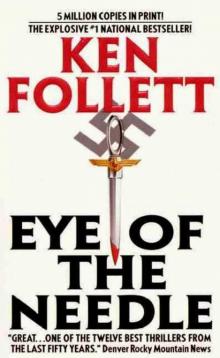 Eye Of The Needle
Eye Of The Needle Lie Down With Lions
Lie Down With Lions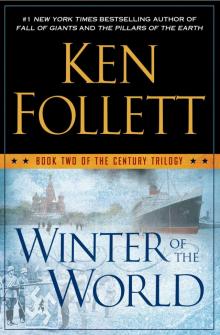 Winter of the World
Winter of the World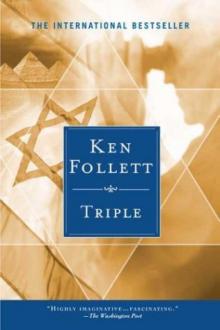 Triple
Triple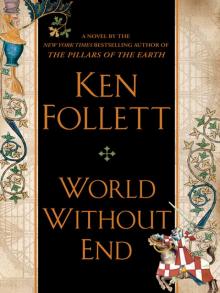 World Without End
World Without End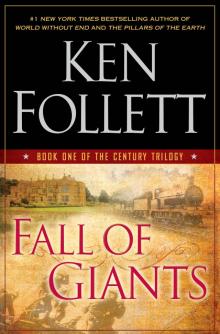 Fall of Giants
Fall of Giants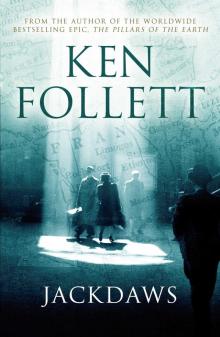 Jackdaws
Jackdaws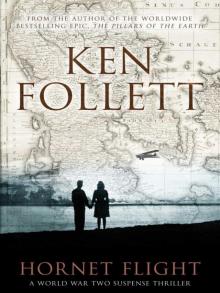 Hornet Flight
Hornet Flight Whiteout
Whiteout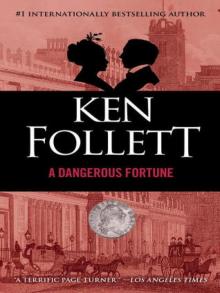 A Dangerous Fortune
A Dangerous Fortune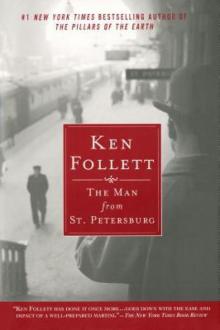 The Man From St. Petersburg
The Man From St. Petersburg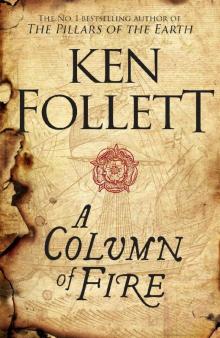 A Column of Fire
A Column of Fire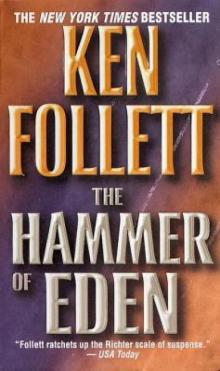 The Hammer of Eden
The Hammer of Eden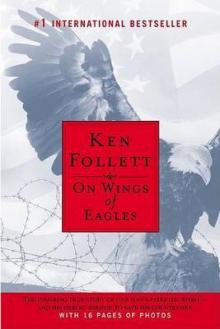 On Wings of Eagles
On Wings of Eagles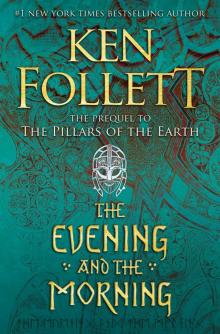 The Evening and the Morning
The Evening and the Morning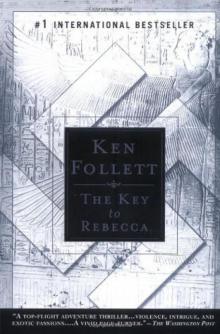 The Key to Rebecca
The Key to Rebecca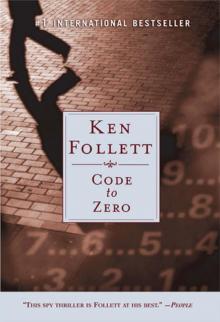 Code to Zero
Code to Zero Paper Money
Paper Money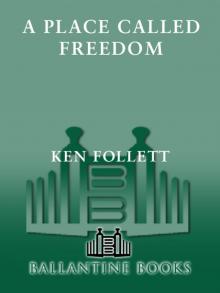 A Place Called Freedom
A Place Called Freedom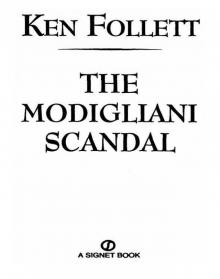 The Modigliani Scandal
The Modigliani Scandal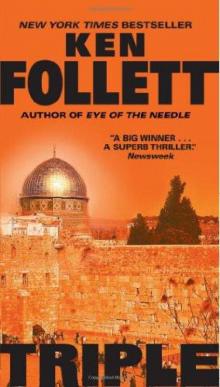 Triple (1991)
Triple (1991)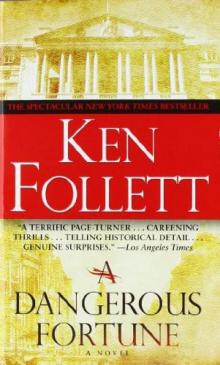 A Dangerous Fortune (1994)
A Dangerous Fortune (1994)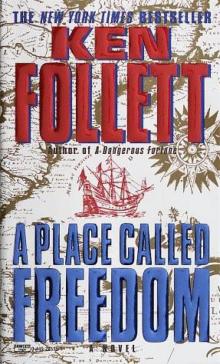 A Place Called Freedom (1995)
A Place Called Freedom (1995)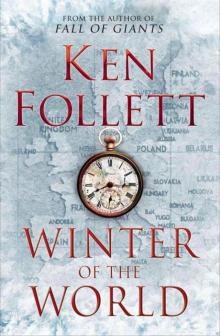 Winter of the World (Century Trilogy 2)
Winter of the World (Century Trilogy 2)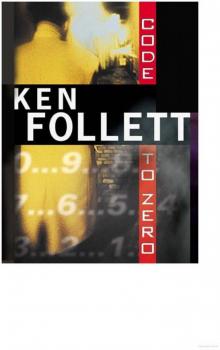 Code to Zero (2000)
Code to Zero (2000)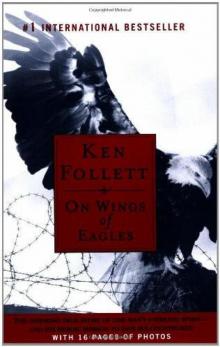 On Wings Of Eagles (1990)
On Wings Of Eagles (1990) Storm Island
Storm Island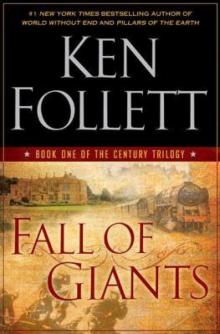 Fall of Giants (The Century Trilogy)
Fall of Giants (The Century Trilogy)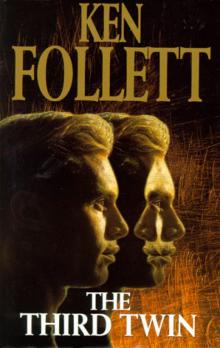 the Third Twin (1996)
the Third Twin (1996)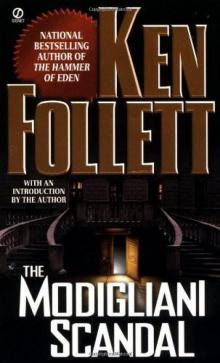 The Modigliani Scandal (1976)
The Modigliani Scandal (1976)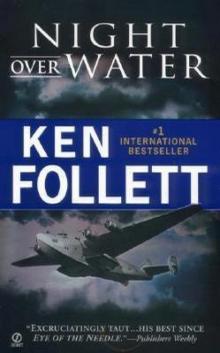 Night Over Water
Night Over Water